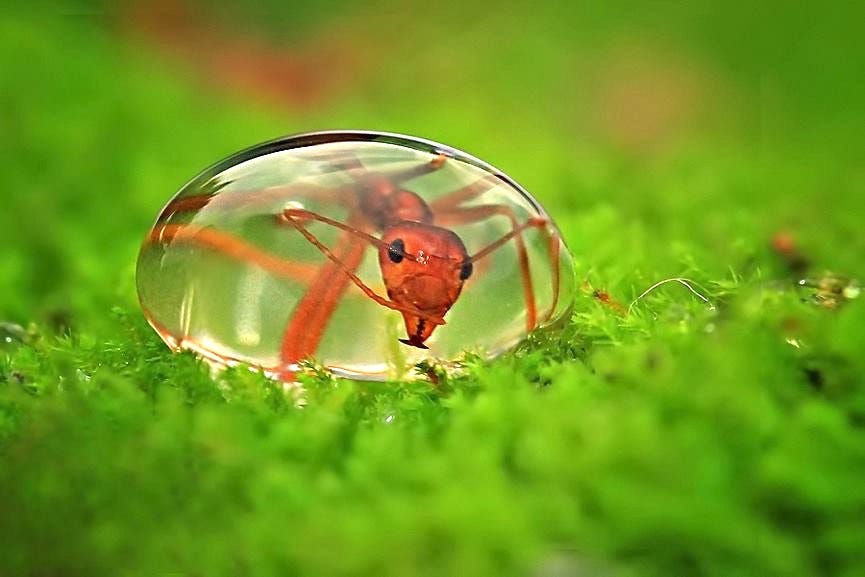Welcome to Twig Technology #4, a fortnightly newsletter on animal tool use and its relationship with our wider world. For more, visit twig-technology.com, or say hello to me (Dr Michael Haslam) on twitter @twig_technology.
We’re settling in today for a good soak. The word—originally Anglo-Saxon socian—comes from the same origins as ‘suck’, and soaking and sucking are both ways to take up liquid. Somewhere in the late 19th century soak and sock (meaning to hit or punish) got mixed up, so we now also have the phrase ‘soak the rich’ to describe taxes that target wealthy people. Enjoy!
Takeaway drinks
Tales of animal tool use tend to favour those creatures we find appealing or charismatic: primates, dolphins, birds, dogs, that kind of thing. But the evolutionary reach of tool use goes much further. Consider the ant. Those of the widespread Aphaenogaster genus inhabit the floors of the world’s forests, and for decades we’ve known that they use small bits of soil and leaf litter to soak up liquids they find near their nests. After leaving these tools in the liquid for a while, and tending to them, they then take the items and their absorbed nutrients back to the nest. They can gather 10x as much food this way, and they have even been seen cutting tools to size as they forage—they’re tool-makers. And in a twist, some researchers now believe that ant personality may be involved in building a special tool-using ant class.
Learn more (via Twig Technology)…

Relax, like they did in the 60s
Ok, we can’t ignore animal charisma altogether. And animal images don’t get much more appealing than the zen calm of Japanese macaques bathing in a hot spring. You’ve likely seen them, serene amid the snows of Jigokudani (which translates as Hell Valley, thanks to the sulphur smell of its thermal springs). And if you haven’t, photos are all over the internet, including here. What you may not know is that this warm soak is not a natural behaviour for the monkeys. It only began around 1963, when macaques that had been lured to the valley with food—to keep them away from the developing ski resorts and farmland of their nearby home turf—encountered a hot tub built by a local inn. At first it was young monkeys enjoying the unusual situation, but the adults warmed to the idea. Eventually the monkeys even got their own purpose-built pool, to avoid human-macaque co-bathing. It’s a tale of enterprising humans and our inquisitive cousins, and the full details have only recently been reconstructed by one of Japanese primatology’s influential leaders, Tetsuro Matsuzawa.
A digital wrinkle
From hot tub macaques we turn to bathing humans, and a familiar experience. When our hands and feet spend too long in warm water, the hairless parts of our skin start to wrinkle. Since the 1930s we’ve known that nerves were involved in prompting these prune fingers, because people who have lost the nerve links to their fingertips don’t have this reaction. We also know that the mechanism likely involves restriction in our blood vessels that shrinks the underlying skin, and not swelling from our absorbing the water around us (osmosis) while we soak. But the big question, which is still unresolved after multiple studies, is why this happens. Specifically, are wrinkled digits an adaptation to help us grip better in the wet, or are they simply a side effect?
Learn more (via Smithsonian Magazine)…
Video: Bathtime struggles
On the African plains a good soaking may well involve a mud bath. Both the water and mud help elephants cool down, but they also present a slippery hazard for the newest additions to the group. In this video from BBC Earth, a wildlife film crew start off enjoying the antics of a baby elephant’s bath, but things get more serious as fatigue sets in. (Spoiler: there’s a happy ending!)
Thanks for reading. If you think someone you know might enjoy this kind of thing, feel free to share using the link below. See you next time!


